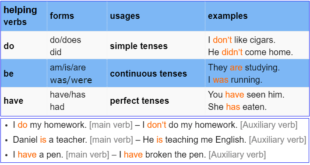Subordinating conjunctions are words that connect dependent clauses to independent clauses. A subordinating conjunction comes before the dependent clause in a sentence. Although it was cold, he wasn’t wearing a sweater. He wasn’t wearing a sweater, although it was cold. The most commonly used subordinating conjunction list after although …
Read More »Prepositions of time
Prepositions of time We use the “preposition of time” when we talk about time. It answers the question of (When). I usually wake up at 6 a.m. I’ll go for a run in the morning. He starts his new job on Monday. Three very common time prepositions at on …
Read More »Adjective order
adjective order When we use several adjectives before a noun, there is a proper way of putting them in order opinion comes before fact opinion (beautiful, delicious, ugly, interesting) fact (new, Italian, black, old) A beautiful old cottage A delicious Italian pizza General idea comes before specific idea general (long, …
Read More »Helping verbs
Helping verbs are verbs that help main verbs show their tenses, question forms, negative forms, etc. helping verbs forms usages examples do do/does did simple tenses I don’t like cigars. He didn’t come home. be am/is/are was/were continuous tenses They are studying. I was running. have have/has had perfect …
Read More »Linking verbs
Linking verbs (also called copula) connect a subject to its complement without expressing an action. (It describes the subject using an adjective or a noun.) The sky is blue. He seems drunk. The weather became warmer. The water feels warm. That meat smells rotten. The food tastes delicious. …
Read More »